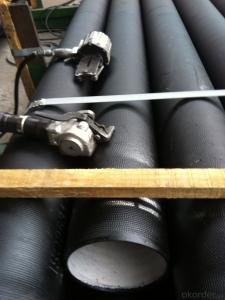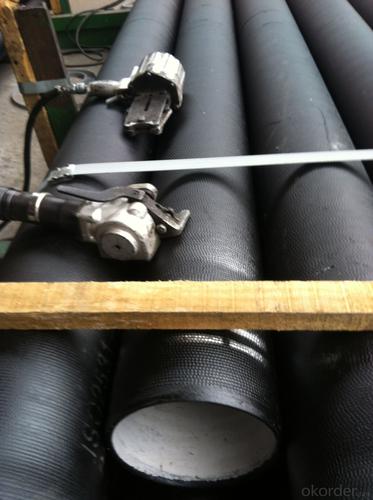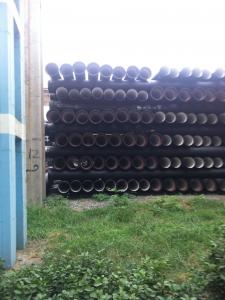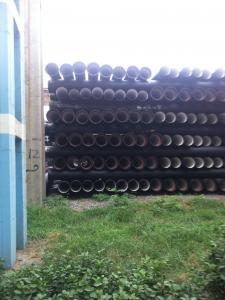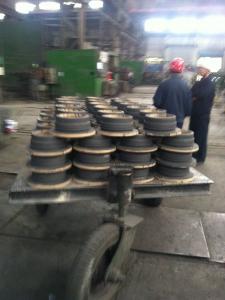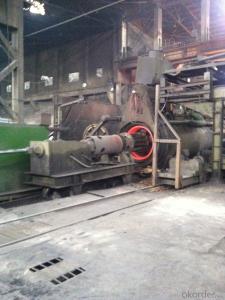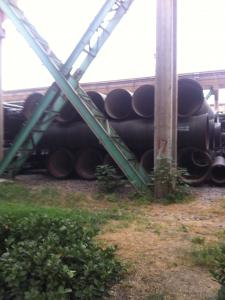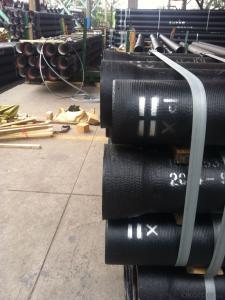DUCTILE IRON PIPES AND PIPE FITTINGS K9 CLASS DN350
- Loading Port:
- Tianjin
- Payment Terms:
- TT OR LC
- Min Order Qty:
- 22 pc
- Supply Capability:
- 3000 pc/month
OKorder Service Pledge
OKorder Financial Service
You Might Also Like
Material : Ductile Cast Iron
Size Range : DN 80mm to DN 2000mm
Unit Effective Length : 6m or 5.7m
Manufacture Standard: ISO 2531:1998/ EN 545:2006/EN 598:2007
Annual capacity : 200,000 tons
Coating Exterior: Zinc 130g/m2 according to ISO 8179-1 and bitumen coating 70 microns.
Cement Interior: Portland Cement/ High Alumina Cement/ Sulphate Resisting Cement Lining according to ISO 4179
Special requirements on external coating and internal lining can be applied
We also provide accessories such as SBR/EPDM rubber gaskets, lubricant paste, pipe caps, PE sleeves, etc.
Additional Parts:
Each pipe is strictly inspected according to related standard to ensure permanently high performance.
Easy Installation at site and service free for life
Long Service Lifespan
Quotation will arrive you within 24hours once we get your inquiry.
We guarantee offering you a competitive price.
A copy of original inspection reports of pipes will be offered after shipment.
Photos of loading process will be sent to the customer after shipment effect.
We will follow-up the delivery progress after shipment effect and update to the customer on weekly basis.
- Q: Can ductile iron pipes be used for mining applications?
- Mining applications can indeed utilize ductile iron pipes. These pipes possess exceptional mechanical properties, including high tensile strength, impact resistance, and durability. As a result, they are well-suited for a range of challenging environments, including mining operations. The pipes are capable of withstanding substantial loads and pressures, making them ideal for the transportation of water, slurry, and other fluids utilized in mining processes. Moreover, ductile iron pipes have a smooth internal surface that minimizes friction and promotes the efficient flow of materials. Consequently, they find extensive use in tasks such as dewatering, tailings disposal, and the transport of corrosive or abrasive substances within the mining industry. Overall, due to their strength, durability, and suitability for demanding conditions, ductile iron pipes offer a dependable and cost-effective choice for mining applications.
- Q: The difference between ductile iron pipe and UPVC drain pipe
- UPVC tube or rigid polyvinyl chloride pipe, U-PVC pipe, is a kind of strong corrosion resistance, acid and alkali salt oil medium erosion, light quality, has certain mechanical strength, good hydraulic conditions, convenient installation, but easy to aging, high temperature resistant, but can not withstand the impact, applied to the domestic water system, DN50 pipe connection DN65, using a ring connected with the above.
- Q: Can ductile iron pipes be used for offshore oil and gas installations?
- Yes, ductile iron pipes can be used for offshore oil and gas installations. Ductile iron is known for its strength, durability, and corrosion resistance, making it suitable for various applications including offshore environments. Additionally, ductile iron pipes are cost-effective and can withstand high pressure and extreme weather conditions, making them a reliable choice for offshore oil and gas installations.
- Q: Are ductile iron pipes suitable for pressure reducing valve stations?
- Ductile iron pipes prove to be suitable for pressure reducing valve stations due to their strength and durability, making them an ideal choice for applications involving high pressure. Pressure reducing valve stations, which regulate and decrease the pressure of a fluid or gas in a pipeline system, can rely on ductile iron pipes to handle the exerted pressure, ensuring an efficient and reliable operation. Moreover, the excellent resistance to corrosion exhibited by ductile iron pipes is crucial in upholding the integrity of the pipeline system, thereby preventing leaks or failures. Overall, the necessary strength, durability, and corrosion resistance required for pressure reducing valve stations are provided by ductile iron pipes.
- Q: Can ductile iron pipe be used for potable water systems?
- Potable water systems can utilize ductile iron pipe. Ductile iron, a form of cast iron, stands out for its strength, durability, and ability to handle high pressure. It is also resistant to corrosion, making it suitable for water distribution systems. Due to its long lifespan and minimal upkeep requirements, ductile iron pipe is frequently employed in potable water systems. Various standards organizations, such as the American Water Works Association (AWWA), have approved its use in potable water applications. However, it is crucial to adhere to the correct standards and regulations during the manufacturing and installation of ductile iron pipe for potable water systems to guarantee the safety and quality of the water supply.
- Q: Are ductile iron pipes suitable for use in wastewater pumping stations?
- Indeed, in wastewater pumping stations, ductile iron pipes exhibit suitability. Ductile iron, a resilient and robust substance, possesses the capacity to endure the demanding circumstances and corrosive properties of wastewater. With its exceptional resistance to corrosion and ability to withstand high-pressure settings, ductile iron pipes represent an optimal selection for the conveyance of wastewater within pumping stations. Notably, these pipes boast an extended lifespan and necessitate minimal maintenance, thereby reducing operational expenses and guaranteeing dependable and effective wastewater transportation.
- Q: How do ductile iron pipes handle ground movement in earthquake-prone areas?
- Ductile iron pipes are designed to withstand ground movement in earthquake-prone areas due to their inherent strength and flexibility. The ductile nature of the iron allows the pipes to deform and absorb the seismic energy without breaking or fracturing. This ensures their durability and ability to maintain water supply and drainage systems even during seismic events. Additionally, ductile iron pipes have superior joint integrity, which further enhances their resistance to ground movement and minimizes the risk of leaks or pipe failure.
- Q: What is the relationship between the mechanical properties of spheroidal graphite cast iron and its spheroidization rate?
- Grade high good, mechanical performance can reach or exceed the standard, the grade is not high, the performance can not be achieved
- Q: How does ductile iron pipe perform in corrosive environments?
- Ductile iron pipe is well-known for its exceptional performance in corrosive environments. It has proven to be highly resistant to corrosion due to its unique composition and protective coatings. The primary factor contributing to its resistance is the presence of graphite nodules, which act as a barrier against corrosive agents. These nodules effectively inhibit the spread of corrosion and provide a protective layer for the iron pipe. Additionally, ductile iron pipes often undergo several external coatings and linings to further enhance their resistance to corrosion. These coatings, such as cement mortar lining or epoxy coatings, provide an additional layer of protection against corrosive substances. They create a barrier between the pipe and the surrounding environment, preventing the corrosive agents from reaching the iron surface. Furthermore, ductile iron pipes are highly durable, which adds to their performance in corrosive environments. They have a long life expectancy and can withstand high-pressure conditions, making them suitable for various applications. The inherent strength of ductile iron makes it less susceptible to damage, even in harsh environments. It is important to note that while ductile iron pipes exhibit excellent resistance to corrosion, the specific performance can vary depending on the nature and concentration of the corrosive substances present. In extremely aggressive environments, additional protective measures such as cathodic protection or sacrificial anodes may be required to ensure long-term durability. Overall, ductile iron pipe has a proven track record of performing exceptionally well in corrosive environments. Its unique composition, combined with external coatings and linings, make it a reliable choice for applications where corrosion resistance is crucial.
- Q: Can cast iron pipes not be used for domestic water supply and drainage?
- Can be used for life drainage, I last year to do the public construction, 24 layers of life and drainage on the cast iron pipe.
Send your message to us
DUCTILE IRON PIPES AND PIPE FITTINGS K9 CLASS DN350
- Loading Port:
- Tianjin
- Payment Terms:
- TT OR LC
- Min Order Qty:
- 22 pc
- Supply Capability:
- 3000 pc/month
OKorder Service Pledge
OKorder Financial Service
Similar products
Hot products
Hot Searches
Related keywords
